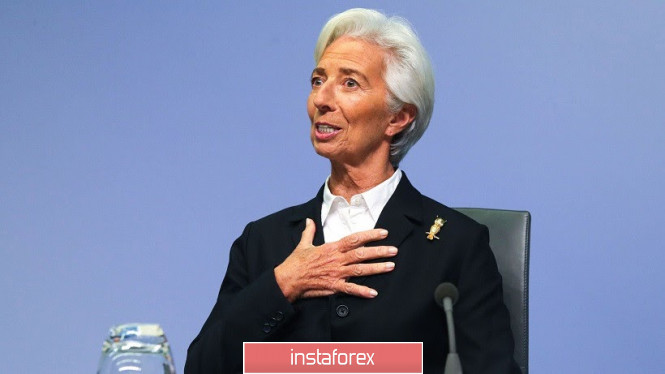The euro-dollar pair is plunging down: at the moment, the bears are trying to gain a foothold below the support level of 1.1050 in order to discover the way to the area of the ninth figure. Although in the morning the pair showed corrective growth, in the hope of hawkish notes from the ECB. But to the disappointment of the EUR/USD bulls, Thursday events turned against the European currency. And it's not just because of Christine Lagarde's overly cautious rhetoric. The financial world today has finally succumbed to panic about the spread of the deadly 2019-nCoV virus. Demand for defensive assets has increased again, as well as that for the US currency, which many investors use as a kind of safe-haven in times of heightened uncertainty. In other words, the EUR/USD bulls hope for a resumption of the upward trend burst like a soap bubble - Lagarde could not support the single currency, while the anti-risk sentiment only increased the pressure on the pair.

The European Central Bank today, quite expectedly, left all the parameters of monetary policy unchanged. In its accompanying statement, the regulator indicated that the ECB rates will remain at the current "or lower level" until inflation approaches the target two percent level "or close enough to this target". This wording was not a surprise to traders. The only innovation in the final communique is the announcement that the ECB will conduct a strategic review of its policy (for the first time in 17 years). However, firstly, this process will take about a year, and secondly, the regulator has not yet shared any details regarding the scope of the policy review. Therefore, the main attention of traders today was riveted to the press conference of Christine Lagarde.
It cannot be said that the head of the ECB took a peremptory-dovish position. Not at all. During her speech, she, in particular, stated that "current rates are worrisome," therefore, in the future, the regulator will take into account the collateral effect of low rates. This statement suggests that there is still a split in the ECB, which appeared back in September last year, when Mario Draghi "pushed" the decision to resume QE. Some of the central bank members then also expressed their concern about the side effect of negative rates.
However, the above remark could not provide the euro with long-term support. Lagarde generally maintained a pessimistic stance on the current situation. First of all, according to the head of the ECB, industrial production is a "brake"on the European economy. On the whole, the existing risks are "tilted downward," although they are less pronounced compared to last year. Despite the signing of the first phase of a trade deal between the US and China, the ECB continues to be concerned about this protracted trade conflict. Lagarde uttered a rather capacious phrase on this subject: "... geopolitics is a threat that leaves the door open for accommodation policy." At the same time, Lagarde rather modestly commented on the growth of European inflation. According to her, the regulator noted "some signs of growth", however, these trends "correspond to earlier expectations". Summing up the January meeting, the head of the ECB said that monetary policy will remain stimulating "for a long period of time", despite some signs of stabilization of the situation in the eurozone.
Buyers of the EUR/USD pair certainly expected more from today's meeting. Previous macroeconomic releases made it possible to count on a more hawkish tone by the central bank chief. Therefore, following the meeting, the pair updated the daily low. But ironically, the press conference of Lagarde coincided with a general increase in anti-risk sentiment in the markets. For example, the yen paired with the greenback fell to the bottom of the 109th figure, and the dollar index jumped to a one-month high (the last time it was at 97.57 points in early December), reflecting investor demand for defensive instruments. Stock indices - on the contrary, collapsed.

Asian markets have been hit hardest. In particular, the Hong Kong Hang Seng index fell 2.8%, the Shanghai blue chips index fell 1.7%, and the Japanese Nikkei lost 0.9%. The shares of tourism and passenger transportation companies (including airlines) fell most strongly. There is growing concern in financial markets that a virus spreading from China could slow global growth. Cases of infection have already been recorded in Taiwan, Thailand, Japan, South Korea, Saudi Arabia and the United States. The authorities of the PRC quarantined two cities in Hubei province (including the 11 millionth Wuhan), canceling all the large-scale events in Beijing dedicated to the celebration of the New Year on the lunar calendar (January 25).
Such unprecedented measures have reminded traders of the effects of the 2003 pneumonia epidemic. Then the key countries of the Asian region in total lost, according to various estimates, from 30 to 40 billion dollars. (first of all, the tourism sector has suffered). The oil market fell then, due to a significant decrease in air transportation, and, accordingly, the demand for aviation fuel and crude oil.
It is worth noting that at the moment it is impossible to say with certainty that a repetition of the year 2003 awaits us, however, in the context of the prospects of the foreign exchange market (and directly the EUR/USD pair), the very fact that traders succumbed to panic is important. If the situation with the spread of the virus will gain momentum, the pair will continue to decline, despite the other fundamental factors. So far, the EUR/USD bulls are defending - the bears have failed to gain a foothold below the support level of 1.1050. But in the event of an increase in anti-risk sentiment, buyers of the pair will not be able to maintain this level - the price will drop to the ninth figure.
The material has been provided by InstaForex Company - www.instaforex.com